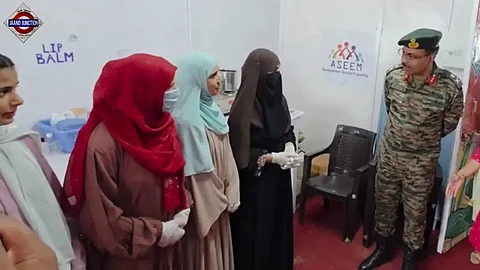

In a powerful step toward women’s empowerment in the sensitive border region of North Kashmir, the Indian Army has given a fresh lease of life to a women-centric Skill Development Training Centre in Baramulla. What was once a modest vocational setup has now been transformed into a modern, multi-skill training hub that caters to the economic aspirations and self-reliance of local women and youth.
Lead by the Indian Army’s Kilo Force in collaboration with the Baramulla district administration, the centre is a shining example of peacebuilding through grassroots empowerment. This initiative aligns with the Army’s broader civil outreach program—where safeguarding borders goes hand in hand with strengthening communities.
The upgraded centre offers three-month certification courses in basic computer education, fashion designing and vocational training in homemade soap and lip balm manufacturing, as well as dry apple processing. It is a locally relevant trade, especially in the apple-rich region of North Kashmir.
These courses are designed not just for theoretical knowledge but with a strong focus on hands-on experience, enabling women to immediately apply their skills either by starting small businesses or contributing to community production units. The goal is to nurture not just skillsets but also confidence and independence among women who have historically had limited access to such opportunities.
This initiative is part of a growing realization that economic empowerment is a powerful antidote to social instability and equipping women with employable skills can have a ripple effect across families and entire communities.
Originally developed in 2009, the Skill Development Centre had already trained over 1,200 youth mostly in computer literacy and basic vocational skills. With the latest technological upgrades and new infrastructure, it now stands as a state-of-the-art facility, poised to serve a new generation of learners with modern tools and more diverse training options.
The revamped centre also features smart classrooms, updated computer labs, dedicated fashion and design workshops and working spaces for vocational production units. These upgrades reflect the Indian Army’s commitment not just to short-term relief, but to sustainable development and future-readiness.
What truly sets the centre apart is the creation of two operational production-based training units: one for Soap and Lip Balm Manufacturing and another for Dry Apple Processing. These are not merely classroom simulations but actual micro-enterprises set up within the centre where women work alongside trainers and experts.
Both units will be run in coordination with local Self-Help Groups (SHGs), allowing women to engage in production activities while receiving on-the-job training. The finished goods are intended to tap into local markets and tourism circuits, especially those focused on organic, handmade, and sustainable products—a trend that is growing rapidly in Kashmir’s eco-conscious tourism industry.
These micro-industries will also serve as a continuous income stream for trained participants, and potentially lay the foundation for future cooperatives or independent startups.
Local women participating in the program have expressed a renewed sense of hope. “We never thought we could work in such a setup right here in our village. It feels like a real opportunity, not charity,” said Shazia Bano, a 22-year-old participant enrolled in the fashion design course.
Parents and community elders have also welcomed the initiative, seeing it as a safer, structured alternative to migration for jobs or education. For many families, this centre represents a pathway to progress without leaving home. It is a vital consideration in a region that has long faced uncertainty.
Speaking at the inauguration, the General Officer Commanding (GOC) of Kilo Force emphasized that the Army is committed to building bridges of trust with local communities. “Empowering our youth, especially our young women, with skills and education is central to building a self-reliant and peaceful Kashmir,” he said.
He noted that the Army’s vision goes beyond just training—it’s about offering a sense of purpose, providing tools for growth, and encouraging economic independence as a foundation for long-term peace and development in the Valley.
The Indian Army, through its civic action programs like this one, continues to play a unique dual role in the region—not just as defenders of the border, but as enablers of change.
This Skill Development Centre is part of a wider trend of Army-supported women empowerment projects in the Valley, including tailoring workshops, educational scholarships, sports tournaments, and healthcare outreach. These efforts recognize that the future of Kashmir lies in its people, and particularly in its women, who are often the first to rise in times of need and the last to receive institutional support.
With the Baramulla centre’s expansion, more women are expected to enroll in upcoming batches, with the hope that many of them will become entrepreneurs, educators, or even trainers for the next generation of learners.
